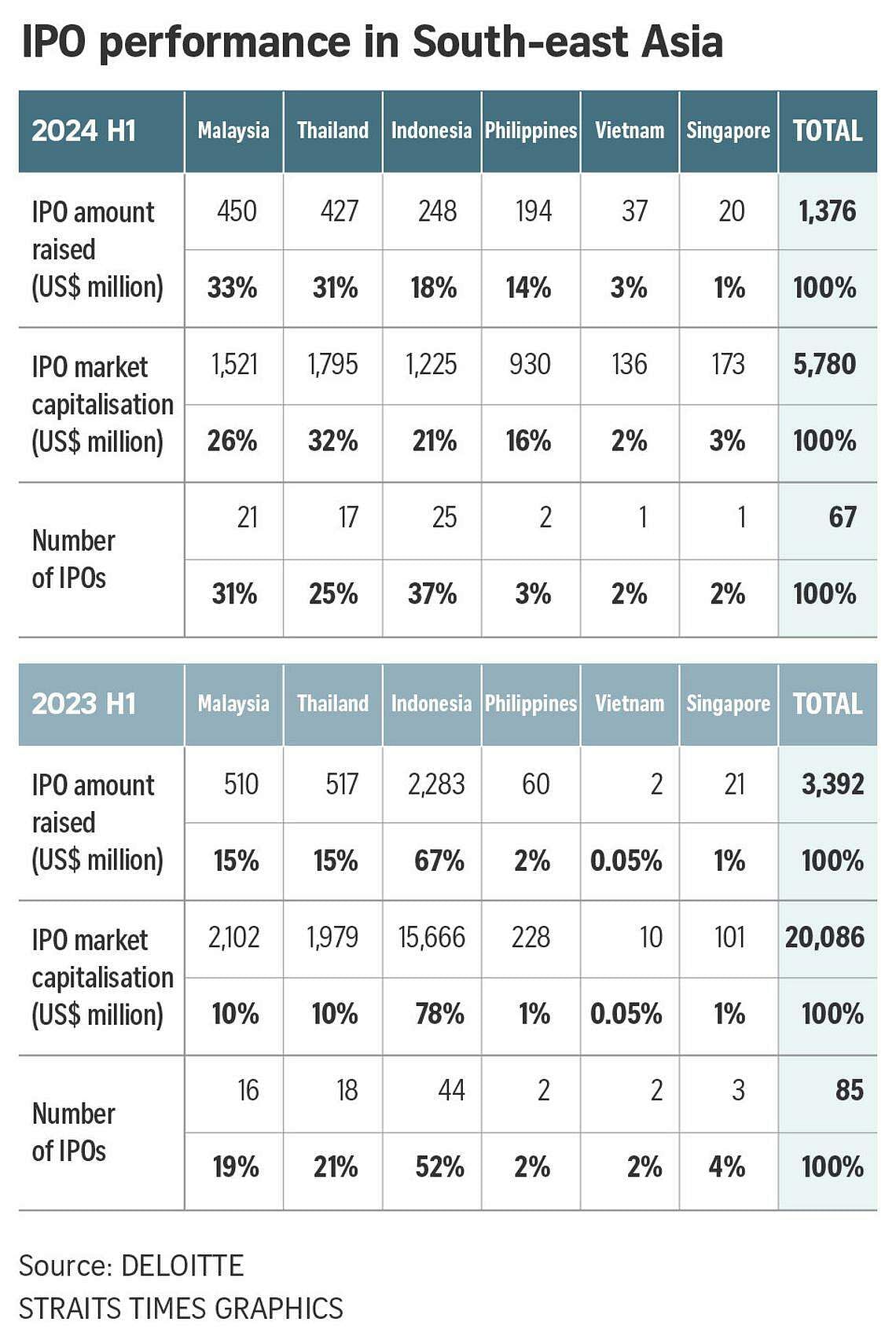- Joined
- Apr 14, 2011
- Messages
- 17,899
- Points
- 113
PROVE THAT SINKIES ARE JIAKLIAOBEES RETARDS UNABLE TO INNOVATE OR START NEW BIZ EXCEPT BECOME HAWKER, SELL INSURANCE/PROPERTY, OR DRIVE GRAB. SO LUCKY WE ARE IN GOOD HANDS!
S’pore draws just one IPO, Malaysia leads South-east Asia listings in first half of 2024

Singapore was the worst-performing stock market in South-east Asia in the first half of 2024. PHOTO: ST FILE

Kang Wan Chern
Deputy Business Editor
UPDATED
JUL 05, 2024, 10:54 PM
FacebookTelegram
SINGAPORE – Only one company braved a listing here in the first half of 2024, making Singapore the worst-performing market in South-east Asia for initial public offerings (IPO).
The dismal result came in spite of intensified efforts to revitalise the Singapore Exchange (SGX), which is falling behind its regional rivals.
The sole new listing was cancer treatment provider Singapore Institute of Advanced Medicine (SAM) Holdings, which raised just US$20 million ($27 million) from its February debut, the smallest amount raised from an IPO in the region this year, noted professional services firm Deloitte.
By comparison, Malaysia listed 21 companies, which raised around US$450 million in all, making it the region’s top IPO market in the first half of 2024.
This was followed by Thailand, where 17 companies went public and raised around US$427 million.
But the wider picture is less rosy as just 67 companies have gone to market in South-east Asia in the six months to June 30, compared with 85 in the same period in 2023, representing a 21 per cent drop.
These firms raised a total of US$1.4 billion, down 59 per cent from US$3.4 billion in the first half of 2023.

Get tips to grow your money and career
Sign up
By signing up, I accept SPH Media's Terms & Conditions and Privacy Policy as amended from time to time.
Yes, I would also like to receive SPH Media Group's
SPH Media Limited, its related corporations and affiliates as well as their agents and authorised service providers.
marketing and promotions.
One reason for the decrease is the absence of large IPOs, Deloitte noted in a July 4 report. It said the largest amount raised in a single listing this year was just US$208 million, compared with three large IPOs in the first half of 2023 that raised around US$600 million each.
The largest IPO in 2024 was commercial bank Thai Credit Bank Public Company, which listed on the Thailand Stock Exchange in February.
The lack of new listings in Singapore comes after a slew of grants and incentives that have been made available to IPO aspirants.
For example, the Monetary Authority of Singapore provides a grant that could enable issuers to defray up to 70 per cent of eligible SGX listing expenses.
Investment funds such as the Anchor Fund @65 and Growth IPO Fund are working closely with companies seeking to list. They have invested in nine since 2022 and are preparing them for SGX listings.
Despite these efforts, five Singapore-based companies have opted to list on stock exchanges in the United States instead of the SGX in 2024, compared with just one that listed at home. These include Haidilao hotpot operator Super Hi International Holding, which made its debut on the Nasdaq in May, while ride-hailing app Ryde Group went public on the New York Stock Exchange in March.
Another local firm, cancer detector Mirxes, filed for an IPO in Hong Kong in May.
There have been renewed calls for the authorities to help revive the local stock market while pressure is mounting on the SGX to attract more high quality IPOs.
Some are proposing that the Government review its investment mandate with GIC to consider allowing the sovereign wealth fund to invest in local stocks.

Second Minister for Finance Chee Hong Tat addressed the issue in written replies to a parliamentary question on July 2, saying the more sustainable way of developing the market is to first have a pipeline of good companies to list here.
He said that given its mandate is to preserve Singapore’s reserves, GIC’s main focus is to invest for good long-term returns, so the Government should not interfere with its investment decisions.
Still, Prime Minister Lawrence Wong noted in replies to parliamentary questions on May 8 that firms are staying private for longer given higher interest rates, and those that choose to go public tend to gravitate to the US due to its deep and liquid capital markets and investor base.
He said such challenging conditions for the local equities market are trends experienced by stock exchanges in developed markets and Singapore must be realistic about what it can do to change them.
Deloitte South-east Asia accounting and reporting assurance leader Tay Hwee Ling noted that while South-east Asia’s IPO market may appear subdued in 2024, there is “cautious optimism” that conditions will improve.
“Looking further ahead, the potential for interest rates to decrease could spur the return of real estate investment trust listings in the region,” she added.
“We anticipate a significant wave of artificial intelligence firms tapping on the IPO capital markets in the coming years, bringing innovation and new opportunities to the market.”



